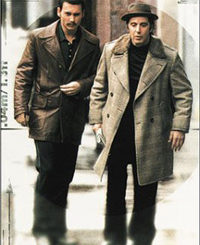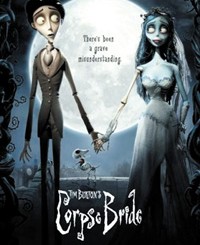 Ed Wood
Ed Wood
with Johnny Depp, Martin Landau, Sarah Jessica Parker
Written by Rudolph Grey, Scott Alexander, Larry Karaszewski
Directed by Tim Burton
(Touchstone Pictures)
by Margaret Smith
Few films are so much a part of our collective American subconscious as Plan Nine From Outer Space. Stephen King dubbed it the worst horror film ever made – deep stuff coming from the director of Maximum Overdrive – it has been universally panned as the worst film in any genre. Naturally, Plan Nine‘s status as the last word in schlock has made the progenitor of Mystery Science Theatre 3000 a never-fading fixture in pop culture. Even those who have never laid eyes on a second of this film know about its memorable quirks: the paper plate flying saucers, the toppling cardboard tombstones, and, of course, a heartbreakingly pathetic Bela Lugosi slinking around in his Dracula cape.
Plan Nine‘s producer/director, Edward D. Wood Jr., was also responsible for a host of other trashy yet oddly visionary films of the 1950’s, including Glen or Glenda and Bride of the Monster. His life story is one of the great legends of film making, and so it’s only right that it should fall into the hands of one of the greatest and most imaginative film makers.
Lovingly shot in a dreamy, period-accurate black and white, the film follows Wood, played exquisitely by Johnny Depp, as he seeks fortune in tinsel town. He knocks on the doors of Hollywood producers, grapples with his love of cross-dressing, and befriends a destitute Bela Lugosi, whom he believes will be the “star” who will push him over the top. Wood’s supreme faith in his visions drives him to do whatever it takes to get them onto film. When he learns of an exploitation movie outfit’s plan to make a film about gender swapping, Wood divulges his clothing fetish to convince the smarmy producer that he is the most qualified person to direct and star in it. He embraces any potential backer, including a Baptist congregation which insists that the cast and crew of Plan Nine be baptized before the church fronts money. He reluctantly gives lead roles to anyone who can secure a cash flow, including the slow-witted son of a wealthy slaughterhouse owner and a starlet whom Wood mistakenly believes has the necessary $60,000 to finance an entire film.
Depp’s Wood is a brisk departure from his trademark slackergoth persona in Edward Scissorhands and What’s Eating Gilbert Grape. Here he subverts his nocturnal, dewey-eyed sensuality for a cheesy pencil line mustache, a manic lisp a la Mel Blanc, and a form-fitting angora sweater. And there is something unfathomably appealing about Depp as a deadpan Wood strutting around in drag on a movie set and barking orders through a megaphone. Driven by a contagious, if warped enthusiasm, Depp’s Wood makes it easy to understand just how the director convinced so many otherwise sensible people to support his projects.
Equally as endearing are Wood’s misfit actor cohorts: Would-be transsexual Bunny Breckenridge, played by a sweetly cynical Bill Murray; gargantuan Swedish wrestler Tor Johnson, played to the hilt by George Steele; TV horror movie hostess Vampira, played by Burton’s wanna-be actress girlfriend Lisa Marie; and, of course, Lugosi, played by Martin Landau. Landau’s Oscar-worthy performance captures Lugosi’s fatal flaws – his vulgar language, his crippling dope habit, and his willingness to do absolutely anything in Wood’s films, including wrestle a giant rubber Octopus in a kiddie pool. These excruciating-to-witness downfalls, however, never cancel out the ethereal, magnetic presence and old world charm which initially catapulted Lugosi to stardom.
Contrary to the conventional belief that Wood exploited Lugosi, this film depicts a touching camaraderie based on the memoirs of those who watched them work together. Here, they are two lost souls offering each other hope where none ought be found, and a friendship so genuine and tender that it’s easy to forget that they are in Hollywood. Their codependence is the nucleus of Ed Wood, which pays as much homage to Lugosi as to Wood himself. After watching it, if you still find you cannot stomach any of Wood’s films, you’ll at least understand how such hare-brained visions made it onto celluloid and how they made their creator immortal.



